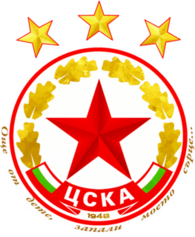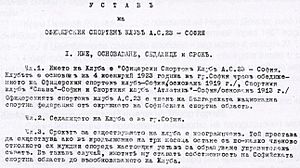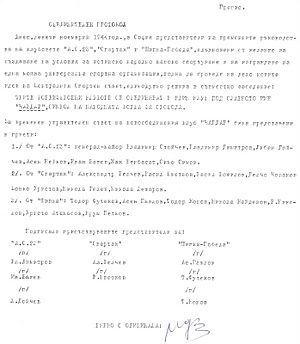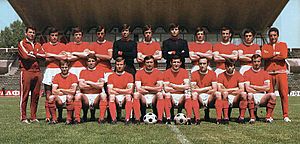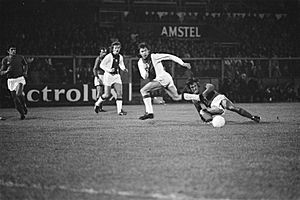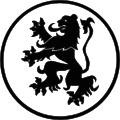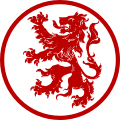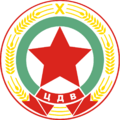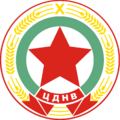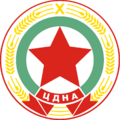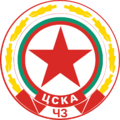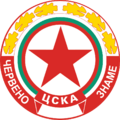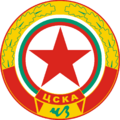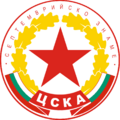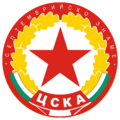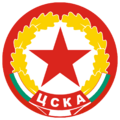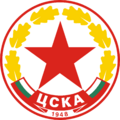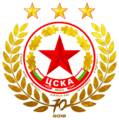PFC CSKA Sofia facts for kids
CSKA Sofia (Bulgarian: ЦСКА София) is a professional football club from Sofia, Bulgaria. The team plays in the country's top football league, the First League. The name CSKA stands for Central Sports Club of the Army. It is named after the Bulgarian Army.
CSKA is known as the most successful football club in Bulgaria. This is according to the International Federation of Football History & Statistics (IFFHS). The club was officially started on May 5, 1948. However, its history goes back to an army officers' club from 1923.
CSKA has won a record 31 Bulgarian league titles. They have also won 21 Bulgarian Cups. In international games, CSKA is the only Bulgarian club to reach the semi-finals of the European Cup twice. They also reached the semi-final of the UEFA Cup Winners' Cup once.
CSKA's home colors are red and white. Their home stadium is the Bulgarian Army Stadium. The club's biggest rivals are Levski Sofia. Games between these two teams are called "The Eternal Derby of Bulgaria".
Contents
Club History
Early Years (1923–1948)
In November 1923, two football clubs, Athletic Sofia and Slava Sofia, joined together. They formed a new club called AS-23. This name stood for Officers' Sports Club Athletic Slava 1923. The Ministry of War supported the club.
AS-23 won its first Bulgarian championship in 1931. They also won The Tsar's Cup that year and again in 1941. The club's stadium, built in 1938, was called Athletic Park. It was located where the Bulgarian Army Stadium is today.
In November 1944, AS-23, Shipka, and Spartak (Poduene) merged. They formed a new club called Chavdar Sofia. Gen. Vladimir Stoychev became the club's chairman.
Forming CSKA (1948–1962)
In February 1948, Chavdar became the club of the Central House of the Troops. It changed its name to CDV. To improve the club, CDV decided to merge with another team. In May 1948, CDV and Septemvri Sofia joined forces. They became "Septemvri pri CDV". This agreement was signed on May 5, 1948. This date is now officially considered the club's founding day.
The club played its first official match on May 19, 1948. They tied 1–1 with Slavia Sofia. Septemvri pri CDV reached the final against Levski Sofia. They won their first ever title with a last-minute goal.
In 1950, the club's name changed to C.D.N.V. (Central House of the People's Troops). They won two league titles in a row. In 1953, the club was renamed again to Otbor na Sofiyskiya Garnizon. Many key players were moved to other teams.
The next year, the club became CDNA (Central House of the People's Army). From 1954 to 1962, the team had amazing success. They won nine league titles in a row. This was a record in Bulgarian football for 60 years. In 1956, they played in the European Cup for the first time. They reached the quarter-finals.
European Success Begins (1960s)
In 1962, CDNA merged with DSO Cherveno Zname. The new name was CSKA Cherveno Zname. The club finished third in the 1962–63 season. The 1963–64 season was their worst in the Bulgarian championship. They finished 11th. This led to coach Krum Milev leaving after 16 years.
CSKA won the title again in 1966. In the 1966–67 season, CSKA achieved its first big international success. They reached the semi-finals of the European Cup. They played against Italian team Inter. After two tied games, CSKA lost the third match 0–1.
In 1968, CSKA merged again with Septemvri Sofia. They became CSKA Septemvriysko Zname. The club won the title in 1969. This was helped by Petar Zhekov, who became a top Bulgarian goalscorer.
Making a Name in Europe (1970s)
The 1970s were a great time for CSKA in Europe. The club started the decade by finishing second in Bulgaria. They reached the round of 16 in the 1970–71 European Cup Winners' Cup. They lost to English team Chelsea.
From 1971 to 1973, CSKA won three league titles in a row. They also surprised everyone in Europe. They beat the strong team Ajax 2–1 in the 1973–74 European Cup.
Next, they played German champions Bayern Munich in the quarter-finals. CSKA lost the first game 1–4 in Munich. They won the second game at home 2–1, but were eliminated. Between 1975 and 1979, the club won two more domestic titles.
More European Adventures (1980s)
The 1980–81 season was another memorable one for CSKA Sofia. They won the Bulgarian title. They also beat European champions Nottingham Forest twice, both times 1–0. They were stopped by future European champions Liverpool in the European Cup quarter-finals.
The next season, CSKA reached their second straight European Cup semi-final. They beat Real Sociedad, Glentoran, and Liverpool. They won 2–0 at home against Liverpool with two goals by Stoycho Mladenov. In the semi-final, they faced Bayern Munich again. CSKA led 3–0 early in the first game in Sofia, but the final score was 4–3 for CSKA. In Munich, they lost 4–0. This was still the furthest a Bulgarian team had gone in the European Cup.
In the Bulgarian league, CSKA kept winning titles until the 1984–85 season. They finished second behind their rivals Levski. However, they still reached the Bulgarian Cup final.
On June 18, 1985, CSKA played Levski Sofia in the Bulgarian Cup final. After the match, both teams were renamed. CSKA became Sredets and Levski became Vitosha. Some players, including Hristo Stoichkov from CSKA, were not allowed to play for a while. A year later, these decisions were changed.
As Sredets, the club finished fourth in the 1985–86 season. In 1987, the club was renamed CFKA Sredets. The next three years were very strong for the team. Septemvri Sofia became an independent club again in 1988. Coached by Dimitar Penev, CFKA won the title in 1987 and 1989. They also reached the UEFA Cup Winners' Cup semi-finals in 1989. They played against Barcelona. Barcelona won both matches, and CFKA was eliminated. However, Barcelona's coach, Johan Cruyff, noticed Hristo Stoichkov's talent. Stoichkov joined Barcelona the next year.
Changes and Challenges (1990s)
The 1990s brought many changes to Bulgarian football. The name CSKA was brought back for the 1989–90 season. They won the title again. In 1991, Valentin Mihov became president of CSKA. The club bought talented Bulgarian players. The Ministry of Defense ended its connection with the club. Despite problems, CSKA won the title again in 1992. They were eliminated from the 1992–93 UEFA Champions League by Austria Wien.
Later, Iliya Pavlov became president. The club changed coaches many times. In Europe, CSKA beat Juventus 3–2 in the 1994–95 UEFA Cup. But the result was cancelled by UEFA due to a player registration issue. Juventus was given a 3–0 win. CSKA lost the second game 5–1.
In 1995, Georgi Vasilev became coach. He helped CSKA win a double (league and cup) in the 1996–97 season. They entered the UEFA Champions League qualifying rounds. They tied 3–3 in Bucharest against Steaua București. But they lost 0–2 at home and were out.
In 1998, Dimitar Penev became head coach again. CSKA reached the second round of the UEFA Cup and won the Bulgarian Cup. But they finished fifth in the league. Young talents like Martin Petrov, Stilian Petrov, Dimitar Berbatov, and Vladimir Manchev started to play more. At the end of 1999, businessman Vasil Bozhkov took over the club.
New Millennium, New Challenges (2000s)
In early 2000, Dimitar Penev was replaced as coach. Several coaches followed in a short time. CSKA finished second in the league, losing the title to Levski in the last match.
In summer 2000, Italian coach Enrico Catuzzi joined. He made the team play well. But he resigned during the winter break. CSKA finished second again.
For the 2001–02 season, Asparuh Nikodimov was coach. He was replaced by another Italian, Luigi Simoni. Simoni could not make CSKA champions. The club finished third and lost the Bulgarian Cup final to Levski.
In 2002, former CSKA player Stoycho Mladenov became head coach. The team won 13 games in a row and won the title for the first time since 1997. However, Mladenov was fired the next season after losing in European competitions. Ferario Spasov took over. At the end of 2004, Serbian coach Miodrag Ješić replaced Spasov. With Ješić, CSKA won their 30th league title in 2005.
In the 2005–06 UEFA Champions League, CSKA played against European champions Liverpool. They lost 1–3 at home but surprisingly won 1–0 away at Anfield.
In the UEFA Cup, CSKA beat Bayer Leverkusen (with Dimitar Berbatov) twice, 1–0. They reached the group stage but were eliminated. CSKA was leading the league by seven points in winter 2005–06. But they lost the lead and finished second. Coach Miodrag Ješić was fired.
In December 2006, Vasil Bozhkov sold the club to Indian businessman Pramod Mittal. Aleksandar Tomov became president. Plamen Markov was replaced by Stoycho Mladenov again. CSKA finished second.
In the 2007–08 season, CSKA bought new players. They were eliminated from the UEFA Cup by Toulouse with a late goal. They also lost in the Bulgarian Cup.
At the end of the season, CSKA won the league title early. They finished 16 points ahead of Levski and did not lose a single match. On May 5, 2008, the club celebrated its 60th birthday.
In June 2008, after winning the title, UEFA said CSKA could not play in the 2008–09 UEFA Champions League. This was because of unpaid debts. This caused big problems for the club. Many key players left, including coach Stoycho Mladenov. Dimitar Penev became head coach for the third time. He had to rely on young players.
Despite the difficulties, CSKA won the Bulgarian Supercup in August 2008. They beat Litex 1–0.
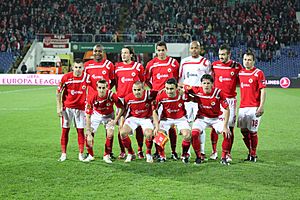
In December 2008, Pramod Mittal sold the club to Titan Sport EAD. Coach Dimitar Penev was replaced by his nephew, Lyuboslav Penev. CSKA finished second in the league, one point behind Levski.
In 2009, CSKA reached the 2009–10 UEFA Europa League group stage. They played against Roma, Basel, and Fulham. They tied their first game against Fulham 1–1. But they did not get more points and finished last in their group. In January 2010, Lyuboslav Penev was replaced by Romanian coach Ioan Andone. Andone resigned after two months. Former CSKA player Adalbert Zafirov took his place. CSKA finished second in the league.
Recent Years (2010s and 2020s)
In summer 2010, Pavel Dochev became head coach. He was fired after poor results. Gjore Jovanovski took over, then his assistant Milen Radukanov. Under Radukanov, CSKA won the 2011 Bulgarian Cup and the Bulgarian SuperCup.
CSKA started 2011–12 with eight league wins. But Radukanov was fired after two disappointing results. Stoycho Mladenov was hired again. He led the club to a second-place finish, just one point behind champions Ludogorets Razgrad.
In 2012, CSKA was surprisingly eliminated from European football by Mura 05. The start of the domestic league was also difficult. But CSKA later beat Levski 1–0 and eliminated Ludogorets in the Bulgarian Cup.
In December 2012, Stoycho Mladenov was fired. Miodrag Ješić was appointed. After only two matches, Ješić was sacked. Milen Radukanov returned and the club finished third.
In June 2013, Hristo Stoichkov was supposed to become coach. But the club's financial problems forced him to leave. Many key players left. CSKA had to withdraw from the 2013–14 UEFA Europa League. On July 10, 2013, the club was bought by the Red Champions Group. Aleksandar Tomov became president again. Stoycho Mladenov was hired back as manager.
The club signed several important players. These included former captains Valentin Iliev, Emil Gargorov, and Todor Yanchev. Goalkeeper Rais M'Bolhi and former Premier League stars Mamady Sidibé and Martin Petrov also joined. On October 19, 2013, CSKA beat Levski 3–0. They were nicknamed The Phoenixes. CSKA beat Levski three more times that season and finished second.
In March 2014, CSKA became the first club from Eastern Europe to be publicly traded. This was to help reduce debt.
Before the new season, some key players left. Goalkeeper Raïs M'Bolhi moved to Major League Soccer. Martin Petrov and Todor Yanchev retired. CSKA was eliminated from the 2014–15 UEFA Europa League by Zimbru Chișinău. But they played well in the league, beating Levski twice. After the winter break, CSKA lost three games in a row. Coach Stoycho Mladenov resigned. Galin Ivanov became coach, then Lyuboslav Penev took over.
In April 2015, the club's ownership changed. CSKA finished fifth that season. But due to unpaid debts, the BFU did not give them a license for the top league. The club was sent to the South-Western V group, the third tier of Bulgarian football.
On June 24, 2015, businessman Grisha Ganchev became the new owner. Plamen Markov became sports director and Hristo Yanev became head coach. Yanev wanted a team of only Bulgarian players.
On May 25, 2016, CSKA Sofia won the 2015–16 Bulgarian Cup. They became the first third-division club to do this. In the final, CSKA beat Montana 1–0.
In June 2016, the legal firm for Litex Lovech was renamed "PFC CSKA-Sofia EAD". This allowed the club to use Litex Lovech's professional license to play in the reformed First League. The old CSKA legal firm went bankrupt.
After some poor results, Hristo Yanev resigned as head coach. Edward Iordănescu was appointed. He resigned in November.
In September 2017, the club announced sponsorships with Mtel and WinBet.
On October 11, 2018, the company holding PFC CSKA-Sofia EAD bought the CSKA Sofia EAD brand. This made them the official successor of the original club.
The 2020s marked CSKA's return to European group stages. They reached the group stage of the 2020-21 Europa League.
Stoycho Mladenov became head coach for the fifth time in 2021. The club reached the group stage of the UEFA Europa Conference League.
In April 2022, Mladenov resigned. Alan Pardew became the first Englishman to manage CSKA. Pardew resigned two months later.
For the 2022-23 season, Serbian football legend Saša Ilić managed the club. The team came very close to winning the title, losing it on the final day.
Club Identity and Supporters
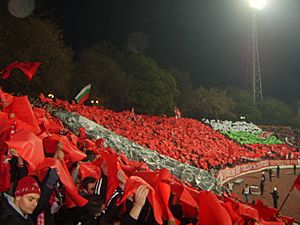
CSKA Sofia is one of the most popular clubs in Bulgaria. It has about 190,000 organized supporters in many fan clubs worldwide. The official fan club started in 1990.
CSKA Sofia's main fan group is called Sector G. This group was officially formed in 1990. Sector G has friendships with other clubs' fan groups, like CSA Steaua București, Partizan Belgrade, and CSKA Moscow. Their rivalry with Levski Sofia's Sektor B group is very strong.
League Positions

Club Achievements
Domestic Titles
Bulgarian A Group:
- Champions (31) (record): 1948, 1951, 1952, 1954, 1955, 1956, 1957, 1958, 1958–59, 1959–60, 1960–61, 1961–62, 1965–66, 1968–69, 1970–71, 1971–72, 1972–73, 1974–75, 1975–76, 1979–80, 1980–81, 1981–82, 1982–83, 1986–87, 1988–89, 1989–90, 1991–92, 1996–97, 2002–03, 2004–05, 2007–08
Bulgarian V Group:
- Champions (1): 2015–16
Bulgarian Cup:
- Winners (21 times): 1951, 1954, 1955, 1960–61, 1964–65, 1968–69, 1971–72, 1972–73, 1973–74, 1982–83, 1984–85, 1986–87, 1987–88, 1988–89, 1992–93, 1996–97, 1998–99, 2005–06, 2010–11, 2015–16, 2020–21
Bulgarian Supercup:
- Winners (4): 1989, 2006, 2008, 2011
Bulgarian Cup – (secondary cup competition)
- Winners (1 time) (shared record): 1980-81
Cup of the Soviet Army – (secondary cup competition)
- Winners (4 times) (record): 1984–85, 1985-86, 1988-89, 1989–90
European Competitions
European Cup / UEFA Champions League
- Semi-finals (2): 1966–67, 1981–82
- Quarter-finals (4): 1956–57, 1973–74, 1980–81, 1989–90
UEFA Cup / UEFA Europa League:
- Round of 32 (3): 1984–85, 1991–92, 1998–99
- Group stage (4): 2005–06, 2009–10, 2010–11, 2020–21
European Cup Winners' Cup / UEFA Cup Winners' Cup
- Semi-finals (1): 1988–89
- Group stage (1): 2021–22
Biggest wins in European tournaments:
- UEFA Champions League – 8–1 in 1956–57 vs Dinamo București
- UEFA Europa League – 8–0 in 2000–01 vs Constructorul; 5–0 in 1999–00 vs Portadown
- UEFA Cup Winners' Cup – 9–0 in 1970–71 vs Haka; 8–0 in 1993–94 vs Balzers; 5–0 in 1988–89 vs Inter Bratislava
- UEFA Europa Conference League – 4–0 in 2022–23 vs Makedonija GP
- UEFA Intertoto Cup – 4–1 in 1996 vs Hibernians
Other Trophies
- Tournament for Stalin's Birthday, Bulgaria: 1951
- Tournament in Antwerp, Belgium: 1958
- Allied Armies Spartakiade: 1958
- Republican Spartakiad, Bulgaria: 1959
- Mohammed V Trophy, Morocco: 1967
- Trofeo Ciudad de Palma, Spain: 1970, 1971
- Blitz Tournament Smolyan, Bulgaria: 1976
- Trofeo Costa de Valencia, Spain: 1976
- Trofeo Ciudad de Zaragoza, Spain: 1977
- Cup Olympic Fire, Bulgaria: 1980
- Torneio Costa Azul, Portugal: 1989, 1991
- Tournament Shumen, Bulgaria: 1993
- Cup Grand-hotel Varna, Bulgaria: 1995
- PlayStation Cup, Bulgaria: 2002, 2005, 2006, 2007
- Thöle-Pokal, Germany: 2003
- Arona Cup, Spain: 2004
- Аrcadia Cup, Turkey: 2007
- Sporx Cup, Netherlands and Germany: 2007
- IFC Pego Cup, Spain: 2008
- Albena Cup, Bulgaria: 2009
- Martyrs of 17 February Cup, Libya: 2012
- Tournament Tsarsko selo, Bulgaria: 2016
- Stubai Cup, Austria: 2017
Club Crest
The main part of the CSKA Sofia crest is a red five-pointed star. This star stands for glory and power. Red is a color often linked with love, freedom, and strength. The six oak leaves above the star show strength, endurance, and traditions.
The club's name and founding year (1948) are below the star. They are placed between two Bulgarian flags. The round shape of the crest means infinity and eternity.
After CSKA won its 30th national title in 2005, three golden stars were added to the logo. In 2017, for the club's 70th anniversary, CSKA updated its crest.
Club Names Over Time
CSKA has had many different names throughout its history. Here they are in order:
- Septemvri pri CDV (Bulgarian: Септември при ЦДВ), meaning September at the Central House of the Troops in 1948 and 1948/49.
- Narodna Voiska (Bulgarian: Народна Войска), meaning People's Troops in 1950.
- C.D.N.V. (Bulgarian: Централен Дом на Народната Войска, Ц.Д.Н.В.), meaning Central House of the People's Troops in 1951 and 1952.
- Otbor na Sofiyskiya Garnizon (Bulgarian: Отбор на Софийския Гарнизон), meaning Team of the Sofia's garrison in 1953.
- CDNA (Bulgarian: ЦДНА, Централен Дом на Народната Армия), meaning Central House of the People's Army from 1954 until the 1961/62 season.
- CSKA "Cherveno zname" (Bulgarian: ЦСКА „Червено знаме“), meaning CSKA "Red Flag" between 1962/63 and 1967/68.
- CSKA "Septemvriysko zname" (Bulgarian: ЦСКА „Септемврийско знаме“), meaning CSKA "September's flag" between 1968/69 and 1984/85.
- CFKA "Sredets" (Bulgarian: ЦФКА „Средец“), meaning Central Football Club of the Army "Sredets" from 1985/86 until 1988/89.
- CSKA (Bulgarian: ЦСКА), meaning CSKA – Central Sports Club of the Army since 1989/90.
Team Kits
After the merger of Chavdar Sofia and Septemvri Sofia, red became the club's home color. White was chosen as the away color.
In the past, black was also used for away or third kits. Other colors like grey, yellow, orange, and green have been seen rarely for third kits. In the 2009–10 season, CSKA used gold for their away kits for the first time.
After using equipment from the Italian company Kappa in 2011–12, CSKA got a new kit supplier in June 2012, the Italian company Legea. The team first wore the new equipment in a friendly match against Torpedo Moscow. The official new kits were shown before a friendly match against Drita on July 14, 2012.
Bulgarian Army Stadium
The team's home stadium, the Bulgarian Army Stadium, was finished in 1967. It is in the same place as the old Athletic Park. The stadium is located in Borisova gradina park in Sofia's city center. It has four sections with a total of 22,995 places, including 18,495 seats. About 2,100 seats are covered. The field is 105 meters long and 68 meters wide.
The sports complex also has a basketball court and gymnastics areas. It is home to the CSKA Sofia Museum of Glory. The press conference room has 80 seats.
Managerial History
Here are the last 10 managers of CSKA Sofia:
| Name | Nat | From | To | Honours |
|---|---|---|---|---|
| Bruno Akrapović | November 11, 2020 | March 28, 2021 | — | |
| Lyuboslav Penev | March 28, 2021 | July 26, 2021 | 1 Bulgarian Cup | |
| Stoycho Mladenov | July 26, 2021 | April 14, 2022 | — | |
| Alan Pardew | April 15, 2022 | June 1, 2022 | — | |
| Saša Ilić | June 2, 2022 | July 28, 2023 | — | |
| Nestor El Maestro | July 29, 2023 | April 14, 2024 | — | |
| Stamen Belchev (caretaker) | April 15, 2024 | May 31, 2024 | — | |
| Tomislav Stipić | June 4, 2024 | August 28, 2024 | — | |
| Aleksandar Tomash | August 28, 2024 | May 31, 2025 | — | |
| Dušan Kerkez | June 4, 2025 | Present | — |
Club Officials
Board of Directors
| Name | Role |
|---|---|
| Owner | |
| President | |
| Honorary President | |
| Executive Director | |
| Sports Director | |
| Administrative Director | |
| Technical Director | |
| Communications Director | |
| Academy Director | |
| Financial Director | |
| International Department |
Current Technical Body
| Name | Role |
|---|---|
| Head coach | |
| Assistant coach | |
| Coach | |
| Goalkeeper coach | |
| Fitness coach | |
| Fitness coach | |
| Analyzer | |
| Analyzer | |
| Psychologist | |
| Technical Associate | |
| Club doctor | |
| Physiotherapist | |
| Physiotherapist | |
| Physiotherapist | |
| Nutritionist | |
| Chief Scout | |
| Scout | |
| Scout | |
| Press Officer | |
| Administrator | |
| Coordinator | |
| Housekeeper |
Club Anthem
The official song of CSKA Sofia is "Sartsa cherveni" ("Red hearts"). It is sung by the famous Bulgarian singer Yordanka Hristova. The song was written in 1999 by composer Evgeni Dimitrov and lyricist Ivaylo Valchev.
See also
 In Spanish: PFC CSKA Sofía para niños
In Spanish: PFC CSKA Sofía para niños
 | Ernest Everett Just |
 | Mary Jackson |
 | Emmett Chappelle |
 | Marie Maynard Daly |


